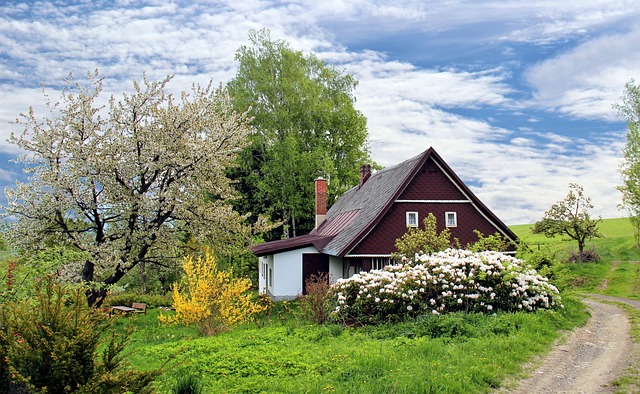This guide outlines essential seasonal garden care strategies. In spring, focus on cleaning, pruning, and preparing with tailored watering. Fall involves removing spent blooms, cutting back perennials, and clearing debris. Winter protection includes covering delicate plants and ensuring proper drainage. Year-round practices emphasize pruning, fertilizing (seasonally), and mulching to manage changes, promoting a healthy garden ecosystem.
In an era of shifting climates, proactive care is essential for thriving gardens. This comprehensive guide navigates the key aspects of seasonal garden maintenance, from spring preparation to winter protection. Discover optimal strategies for spring garden preparation, ensuring a solid foundation for success. Learn expert tips on summer watering to promote plant health and resilience. Explore fall cleanup techniques to shield your garden for winter and prepare for the next growing season. Additionally, gain insights into winter protection methods, pruning, fertilizing schedules, seasonal pest control, and the benefits of mulching through each changing season.
- Spring Garden Preparation: Setting the Stage for Success
- Summer Watering Tips: Ensuring Plant Health and Resilience
- Fall Cleanup Strategies: Preparing for Winter and Next Spring
- Winter Garden Protection: Safeguarding Plants Against Harsh Conditions
Spring Garden Preparation: Setting the Stage for Success

Spring marks a pivotal time for your garden, serving as the catalyst for a vibrant and thriving outdoor space throughout the year. This is when you lay the groundwork for success by engaging in essential seasonal garden maintenance. Begin with a thorough cleaning, removing any dead plant matter to prevent pest breeding grounds and disease spread. Follow this with pruning of seasonal plants, trimming back perennials and cutting away any damaged or diseased wood. This stimulates new growth and ensures your garden is set up for robust health during the upcoming months.
As you prepare for the warmer summer days ahead, implement effective watering strategies. Consider the specific needs of different plant types and adjust your watering frequency accordingly. For instance, newly planted seeds and seedlings require consistent moisture, while established shrubs and trees may need less frequent but deeper waterings. Fall cleanup is another crucial step in seasonal garden care, focusing on removing spent blooms, cutting back perennials, and clearing debris to prevent pest issues and disease overwintering. Protect your garden during winter with appropriate coverings for delicate plants and by ensuring proper drainage to avoid frost damage. Don’t forget to fertilize according to the season; spring and fall are typically ideal times to nourish your garden, promoting robust growth and health. Finally, employ mulching techniques throughout the year to help regulate soil temperature, suppress weeds, and retain moisture—a simple yet powerful tool for managing seasonal changes in your garden.
Summer Watering Tips: Ensuring Plant Health and Resilience

As the seasons change, so do the needs of your garden. Summer brings intense heat and prolonged dryness, requiring specific care to keep plants healthy and resilient. Implementing effective summer watering tips is crucial for seasonal garden maintenance. Water early in the morning to minimize evaporation, ensuring that the water reaches the root zone efficiently. Avoid watering during the hottest parts of the day as it can lead to leaf diseases. Create a watering schedule based on your region’s climate and plant types; some plants may require more frequent, shallow watering, while others thrive with less but deeper irrigation.
In addition to watering, fall cleanup strategies are essential for preparing your garden for the upcoming winter. Remove dead leaves and debris to prevent pest habitats and reduce potential disease spread. Prune seasonal plants, trimming back damaged or diseased growth to promote new, healthy growth in the spring. Fertilizing schedules should also be adjusted; apply fertilizers specifically tailored for summer growth in early spring to fuel robust plant development. Seasonal pest control measures are vital; monitor plants for common summer pests and use environmentally friendly methods to manage them effectively. Finally, consider mulching around plants to retain moisture, regulate soil temperature, and suppress weeds—an effective strategy for adapting to seasonal changes.
Fall Cleanup Strategies: Preparing for Winter and Next Spring

As autumn winds down, preparing your garden for the changing seasons is essential to ensure robust health come spring. Fall cleanup strategies are a proactive step in this process. Begin by removing dead plant matter and spent flowers to reduce pest habitats and prevent disease spread. Prune seasonal plants, focusing on shaping and tidying to promote new growth in the next season. Remember that proper pruning techniques vary by plant type, so research or consult with an expert for best results.
Prepare for winter by offering extra protection to delicate plants. This might include covering tender perennials with mulch or fabric covers, which also help insulate the soil and reduce moisture loss during dry spells. Establish a regular fertilizing schedule tailored to each season. For example, apply a balanced fertilizer in late summer/early fall to promote robust root growth before winter dormancy, and use a slow-release fertilizer in spring to fuel new growth and blooming. Seasonal pest control measures should also be considered, focusing on specific issues prevalent during each phase of the year. Effective mulching not only adds aesthetic appeal but is a practical way to manage soil temperature and moisture throughout these seasonal changes.
Winter Garden Protection: Safeguarding Plants Against Harsh Conditions

As the seasons change, so do the needs of your garden. Winter poses unique challenges, demanding proactive care to protect plants from harsh conditions. Implementing strategies like proper pruning, fertilizing according to seasonal schedules, and effective pest control is crucial for maintaining a healthy garden throughout the year.
Before winter sets in, consider mulching to insulate plants, retain soil moisture, and suppress weeds. Spring cleanup strategies should include removing dead plant matter while also preparing for upcoming summer watering needs. Balanced fertilization during spring fosters robust growth, and regular monitoring ensures any pest issues are addressed promptly. These seasonal garden maintenance practices not only safeguard your plants but also contribute to a vibrant, thriving garden come spring and summer.
By adopting a proactive approach to seasonal garden maintenance, including spring garden preparation, tailored fertilization and pruning schedules, effective summer watering practices, strategic fall cleanup strategies, and robust winter protection methods, you can ensure your garden’s resilience against changing climates. Integrating seasonal pest control measures and utilizing mulching techniques further fortifies your landscape against the elements. These holistic strategies not only promote plant health but also contribute to a vibrant, thriving garden throughout the year.
